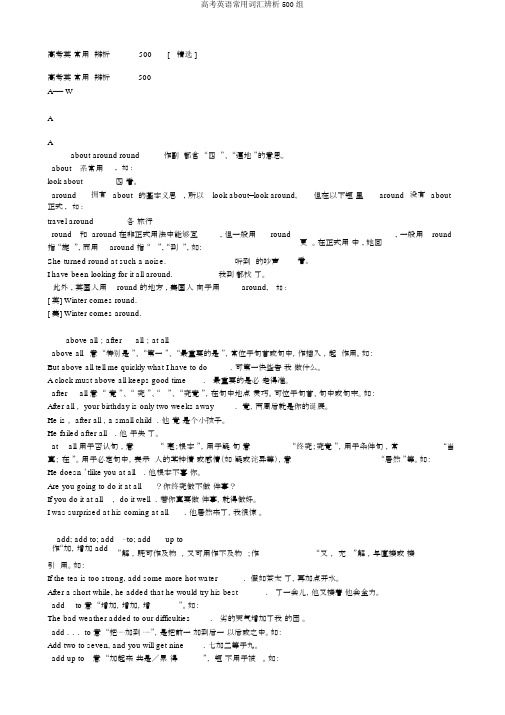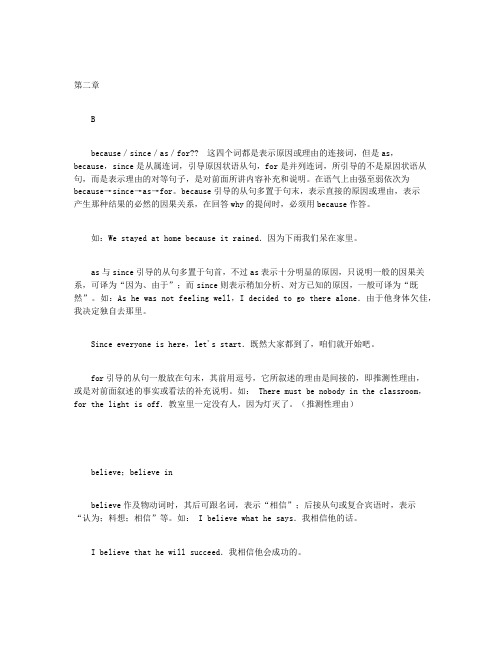高考英语常用词汇辨析500例
- 格式:doc
- 大小:378.00 KB
- 文档页数:77

第十三章Nnone/nobody (no, one)/nothing none既可指人又可指物,意为“没有任何人或物;一个人也没有”,后可跟of短语连用,作主语时,谓语动词用单数或复数均可。
例如:—Have you bought any clothes?你买衣服了?—None.一件也没买。
None of us has/have been to Macao.我们没有一个人去过澳门。
no one=nobody,只能指人,意为“没有人”;nothing只能指物,表示“没有什么(东西)”。
它们不可与of短语连用,作主语时谓语动词只能用单数。
例如:Nobody(No one)likes to lose money,does he?谁也不喜欢丢钱,对吗?There's nothing in the bag.口袋里什么也没有。
Ooccur;happen;take place三者都表示“发生”,都是不及物动词。
happen指“偶然发生”时,主语为“事”;当主语是“人”时,意为“碰巧”。
occur 指“发生”时可与 happen 换用,但后接to sb./sth.时,两者含义不同:happen to sb./sth.指不好的事情发生在某人(物)身上;occur to sb./sth.指“某种思想等呈现于某人的知觉中”。
take place 表示“发生”,可与 happen 或occur换用,但其后面一般不接 to sb./sth.结构;指必然会发生的事情时,多用 take place;此外take place 还可表示“举行某种活动”。
如:He happened to know the place.他碰巧知道那个地方。
When did the earthquake occur/happen?地震是什么时候发生的﹖Didn’t it occur to you to phone them about it?你难道就没想过给他们打个电话﹖Has anything happened to him﹖他出什么事了吗﹖In 1919, the May 4th Movement took place in China.一九一九年,中国发生了五四运动。

- 1 -高中英语重点词语辨析900例都有“指责,控告”之意,有时可通用,但结构不一样。
accuse 不一定针对重大过失或罪行,其结构为accuse sb of sth 。
而charge 一般用于重大过失或罪行,其结构为charge sb with sth ,此结构还有“使某人负有……责任”之意。
例如:例1:My father accused me of my being too careless. (父亲责备我太粗心。
) 例2:He accused me of neglecting my duty. (他指控我玩忽职守。
) 例3:He charged me with neglecting my duty. (同上)例4:Jimmy was charged with murder. (吉米被控谋杀。
)(他担负有一项重要任务。
) :把……加到。
例如: 例6:At the end of the party, we added another program. 例7:You needn’t add any water to the medicine.add to :增添。
指增添喜悦、悲伤、麻烦等。
例如:例8:His coming added to our trouble. (他的到来给我们添了麻烦。
)add up :加起来。
例如:例9:Have you added up all the numbers?add up to :总计。
表示加起来的结果,无被动结构。
例如:例11:I advised (his) trying again. (= suggest)例12:I advised that we (should) try again. (= suggest ,虚拟语气。
) 例13:I advised him to give up smoking. 例14:I advised him not to smoke.例15:Could you advise us on how to learn English?例16:Could you give us some advice on how to learn English?suggest :建议,表明,暗示。

高考英语常用同义词辨析汇总1. a good/great many(of)/a number of/a large quantity of/plenty of/a large amount of/a great deal of2. a number of/numbers of/the number of. . .3. abandon/desert4. abolish/cancel5. above all/first of all/at first6. accuse/charge/blame/scold7. acquire/obtain/gain/win/earn8. adjust/adapt9. adopt/adapt10. agreement/contract/bargain11. also/too/either/as well/besides/moreover12. anxious/eager/keen13. apart from/except/except for/except that/besides14. argue/debate/discuss/quarrel15. ashamed/shameful/shame16. at ease/with ease17. attempt/try/manage18. attend/join/join in/take part in/participate in19. average/common/ordinary/general/usual20. award/reward/prize21. beat/strike/hit22. because of/owing to/thanks to/due to23. before/since/until24. blame/condemn/scold25. bother/interrupt/trouble/disturb26. break into/break in27. burden/load28. calm/still/quiet/silent29. care about/care for30. cause/reason31. celebrate/congratulate/observe32. certain/sure33. choose/select/elect/pick34. close/closely35. come about/happen/take place/occur/break out36. come to power/be in powere true/realize38. common/ordinary/usual/average/universal39. compare/contrast40. conflict/fight/war/struggle41. confuse/puzzle42. consequently/so43. considerate/thoughtfulthoughtful 指为他人着想,主动关怀,做有益于他人的事。

高考英常用辨析500[ 精选 ]高考英常用辨析500A—— WAAabout around round作副都含“四”、“遍地”的意思。
about系常用,如 :look about around拥有四看。
about的基本义思, 所以look about=look around,但在以下短里around没有about正式 ,如 :travel around各旅行round 和 around 在非正式用法中能够互, 但一般用round 指“旋”, 而用around 指“ ”, “到”, 如:She turned round at such a noise.听到的吵声I have been looking for it all around.我到都找了。
此外 , 英国人用round 的地方 , 美国人向于用around,如: [ 英] Winter comes round.[ 美] Winter comes around.更。
在正式用中, 她回看。
, 一般用roundabove all ; after all ; at allabove all意“特别是”、“第一”、“最重要的是”,常位于句首或句中,作插入,起作用。
如:But above all tell me quickly what I have to do.可第一快些告我做什么。
A clock must above all keeps good time.最重要的是必走得准。
after all 意“ 竟”、“ 究”、“ ”、“究竟”,在句中地点灵巧。
可位于句首、句中或句末。
如:After all , your birthday is only two weeks away.竟,两周后就是你的诞辰。
He is , after all ,a small child .他竟是个小孩子。
He failed after all.他于失了。
at all 用于否认句,意“ 毫;根本”,用于疑句意“终究;究竟”,用于条件句,常真;在”。

第二章Bbecause/since/as/for?? 这四个词都是表示原因或理由的连接词,但是as,because,since是从属连词,引导原因状语从句,for是并列连词,所引导的不是原因状语从句,而是表示理由的对等句子,是对前面所讲内容补充和说明。
在语气上由强至弱依次为because→since→as→for。
because引导的从句多置于句末,表示直接的原因或理由,表示产生那种结果的必然的因果关系,在回答why的提问时,必须用because作答。
如:We stayed at home because it rained.因为下雨我们呆在家里。
as与since引导的从句多置于句首,不过as表示十分明显的原因,只说明一般的因果关系,可译为“因为、由于”;而since则表示稍加分析、对方已知的原因,一般可译为“既然”。
如:As he was not feeling well,I decided to go there alone.由于他身体欠佳,我决定独自去那里。
Since everyone is here,let's start.既然大家都到了,咱们就开始吧。
for引导的从句一般放在句末,其前用逗号,它所叙述的理由是间接的,即推测性理由,或是对前面叙述的事实或看法的补充说明。
如: There must be nobody in the classroom,for the light is off.教室里一定没有人,因为灯灭了。
(推测性理由)believe;believe inbelieve作及物动词时,其后可跟名词,表示“相信”;后接从句或复合宾语时,表示“认为;料想;相信”等。
如: I believe what he says.我相信他的话。
I believe that he will succeed.我相信他会成功的。
believe in 是一个动介型短语动词,表示“信奉;信仰”(指对某种思想、主张、观念、行动具有信心)和“信任(have trust in)”。

高考英语常用词汇辨析500例◆wash/wash away◇wash表示“洗(手、衣服等”,既可作及物动词,又可作不及物动词;◇wa sh away表示“冲走”、“冲垮”、“洗掉”,作及物动词短语用。
[EXERCISES]①The flood some of the houses in the village.②He his face and hands,then went down stairs.③You must before dinner.(Keys:①washed away②washed③wash◆wear;have on;put on;dress;(bein+颜色(服装、眼镜等◇wear主要用于穿衣服、戴眼镜(手套、首饰、帽等,以强调“穿(戴着”的状态。
例如:Mr Wu always wears a blue coat in winter.吴老师冬天总是穿着一件蓝色大衣。
◇have on作“穿(戴着”解,同wear一样,也表状态,但不用于进行时态。
例如:Xiao Wang ha s on a white shirt today.(=Xiao Wang is wearing a white shirt today.小王今天穿着一件白衬衫。
◇put on着重强调“穿(戴上”的动作。
例如:I like to put on my hat when I go out in winter.冬天,我喜欢外出时戴上帽子。
◇dress既可作及物动词,又可作不及物动词,所接宾语是人而不是衣、帽等物。
例如:1Her mother is dressing her.她母亲正在给她穿衣服。
2The nurses are dressed in white.护士穿着白衣服。
◇“(bein+颜色或服装、眼镜等”也表示“穿着”的状态,在句中作表语或定语。
例如:He is in uniform today.他今天穿着制服。
高考英语易混词辨析1.forgettable易被忘记的forgetful健忘的2.valueless无价值的invaluable非常贵重的3.economic有关经济的economical省钱的4.creation创造creativity创造力5.physician内科医生physicist物理学家6.comparable比得上的comparative相对的7.ashamed感到羞耻的/惭愧的shameful可耻的8.confident有信心的confidential秘密的9.disability缺陷,障碍inability无能,不能10.objection反对objectivity客观性11.worthless不值钱的priceless无价的12.impress留下印象impressive令人赞叹的13.response反应,回应responsible负责任的14.faith信心faithful忠诚的15.respect尊敬respective各自的,分别的16.occasion场合occasional偶尔的17.title标题entitle给予……权利18.reward奖励rewarding值得做的,高酬的19.found建立foundation基础,基金会20.drama戏剧dramatic突然的,戏剧般的21.trick花招tricky难对付的22.promise答应,预示promising有前途的23.invite邀请,招致inviting诱人的24.affect (v.)影响affection慈爱25.creation创造recreation娱乐26.promise许诺compromise妥协,让步27.temporary暂时的contemporary当代的28.present礼物;目前的represent代表29.strict严格的restrict限制30.science科学conscience良心31.knowledge知识acknowledge承认32.allow允许allowance津贴33.bowl碗bowling保龄球运动34.instant瞬间instance例子35.search搜查research研究36.sweat汗水,出汗sweet 甜的sweater毛衣37.appointment任命,约定disappointment失望38.stock股票,库存stocking长筒袜39.short短的shortly不久40.inform通知informal非正式的十二、易混词辨析41.easy容易的uneasy不安的;焦虑的41.ensure保证insure投保assure向……保证42.submit提交summit峰会,山峰43.initial最初的essential必不可少的44.contest竞赛context上下文45.pray祈祷spray喷射46.construct建造(v.) instruct指导,指令(v.)47.watch手表,观看match比赛48.succeed成功(v.) success成功(n.)49.image图形,形象,声誉imagine想象50.royal皇室的,高贵的loyal忠诚的51.steal偷steel钢52.access通道assess评价53.pocket口袋packet包54.relieve缓解believe相信55.relief宽慰belief信仰56.bridge桥fridge冰箱57.award奖品reward奖赏58.previous先前的precious宝贵的59.incident事件accident意外60.population人口pollution污染61.invent发明(v.)invest投资(v.)62.respond to对……做出回应correspond to与……一致63.statue雕像status地位,声誉64.source来源resource资源65.surrounding周围的(adj.) surroundings周围环境(n.)66.cure治愈curse诅咒67.sympathy同情(n.) symphony交响曲68.floor地板flour面粉69.college学院colleague同事70.design设计resign辞职71.medal勋章model模型,模特72.elect选举,推选select选择73.patent专利patient病人;有耐心的74.metal金属mental精神上的75.attitude态度altitude海拔76.desert沙漠,遗弃(v.) dessert甜点77.director负责人directory名录78.composition作文,作曲competition比赛79.together一起altogether总共80.consumption消费assumption假设81.apartment公寓套房department部门,大学的系、科82.institution协会constitution宪法,构造83.wonder奇迹,想知道(v.) wander闲逛,徘徊84.explain解释complain投诉,埋怨85.critic批评家critical批评的,至关重要的86.lesson课,教训lessen减少87.band乐队brand品牌,商标88.addition加,增加物addiction入迷,瘾89.import进口export出口90.adapt适应adopt采纳,收养91.tune调子,旋律tone腔调,音调,色调,风格92.section部分,部门,分支session会议,学期93.distribute分配,分发contribute做贡献,促成94.soup汤soap肥皂95.region地区religion宗教96.mount山峰;攀登(v.)amount数量97.personnel人事personal个人的98.nature自然mature (谷物、时机)成熟的99.headline标题deadline截止日期100.leather皮革feather羽毛101.describe描述subscribe订阅,同意102.cease停止tease取笑103.eagle鹰angel 天使angle角度104.contact接触contract合同105.evaluation评价evolution进化106.tension紧张extension延伸,扩大107.distance距离instance例子108.point指向;点appoint任命109.construction建造destruction毁坏120.constitute构成,组成(vt.) substitute替代物;替代(v.)121.tough 坚硬的,棘手的rough粗糙的,粗野的,天气恶劣的122.scare吓唬scarce罕见的,缺乏的123.passage短文,走廊,通道passenger乘客124.include包括(vt.)exclude不包括,排斥(vt.)125.enquire询问acquire获得126.cover覆盖,报道uncover移去盖子recover康复discover发现127.though尽管thought思考through穿过thorough彻底的128.late晚的lately最近later后来 latter后者latest最新的129.deserve值得preserve保护conserve保护reserve保护区;预定(v.)130.broad宽阔的board板;董事会abroad在海外 aboard在飞机/汽车/轮船上131.except除了expect期望respect尊敬inspect视察132.live adj.现场直播的,活的living adj.活着的;健在的,在使用的alive adj.活着的,有活力的lively adj.生气勃勃的133.sensible adj明智的,合理的sensitive adj.敏感的,灵敏的,体贴的134.special adj.特别的,专用的particular adj.专指的,格外的specific adj.明确的,特定的135.effective adj.有效的,实际的efficient adj.效率高的137.rough adj.粗糙的,粗略的,粗暴的tough adj.艰难的,坚强的138.continual adj.连续的,频繁的continuous adj.连续的(指从不间断的) 139.considerable adj.相当多(或大、重要等)的considerate adj.体谅的,考虑周到的140.respectable adj.值得尊敬的,相当好的respectful adj.尊敬的,表示敬意的respected adj.受尊敬的respective adj.分别的,各自的141.likely adj.可能的likable adj.可爱的dislike v.不喜欢alike adj.相似的unlike adj.不同的142.quantity n.数量quality n.质量143.camp n.宿营champion n.冠军campaign n.运动campus n.(大学、学院的)校园144.bank n.银行,库,河畔band n.乐队bond n.关系brand n.品牌145.ash n.灰烬cash n.现金146.sigh v.& n.叹气signal n.信号 v.发信号,表明sign n.标志,迹象v.签署147.flight n.航班,飞行fright n.害怕frighten v.使惊吓fight v.&n.打架,打仗148.advance v.& n.前进,进步adventure n.冒险advantage n.优点149.biology n.生物,生物学biography n.传记150.lie→lay→lain→lying躺,位于lie→lied→lied→lying撒谎lay→laid→laid→laying下(蛋),产(卵),安放,搁delay→delayed→delayed→delaying推迟151.star n.星stare v.凝视starve v.(使)挨饿152.explain v.解释complain v.抱怨plain n.平原adj.平凡的,极普通的153.offend v.冒犯defend v.防御154.rise v.上升raise v.提升,饲养arise v.产生praise v.表扬arouse v.激起155.amaze v.使惊奇amuse v.(使)娱乐156.attract v.吸引attack v.攻击157.effect n.影响affect v.影响(主要指一时的影响,着重影响的动作,可指一般意义的影响,也可指不良影响) influence v.& n.影响(主要指对行为、性格、观点等产生间接的或潜移默化的影响)。
高考常用英语词语辨析展开全文让我们共同成长“词语辨析”不是考试的重点,但一旦考到,又很要命,因为这些题目对任何学生都是难点。
教学上既不能用时过多,也不能忽视。
强记下列的100多组,高考基本上就够用了。
常用英语词语辨析1.elder 与elderly两者都为“年老的”,但有细微的差别。
elderly 指中年与暮年之间的年龄,表示人已过中年,因此,这词常用来代替old。
elder指年龄稍长者,适用于家庭的兄弟姐妹之间。
2.precious 和 expensiveexpensive 表示“昂贵的”。
precious 表示“珍贵的,宝贵的”。
3.regret to do 和 regret doingregret doing 表示“做了某事而感到遗憾或后悔”,v-ing 动作发生在regret 之前。
regret to do 指“当时或现在遗憾地做什么”。
4.day by day 和 day after dayday by day 只用作状语,表示“一天天地”, 有逐渐转变的意思。
day after day 可作主语,宾语等,亦可作状语,表示“一天又一天”,强调动作的重复,表示时间的长久。
5.damp 与 wet两者都表示“潮湿的”,但有细微差别。
wet 指曾浸泡在液体中或布满了液体的东西,或指多雨的天气。
如: It's a wet day. 今天是一个雨天。
/ wet clothes 湿衣服。
damp 指未湿透但潮湿的东西。
The damp in the air makes me uncomfortable. 潮湿的空气使我感到不舒服。
6.hunger 与 starvation两词都表“饥饿”。
hunger 指人对食物的迫切要求,是一种正常的生理现象。
starvation 指长时间缺乏食物引起痛苦,与hunger相比是不正常的生理现象,而是人为的灾难。
7.boring 与 dull , tiresomeboring 概念最广,尤指引起人厌倦、枯燥的谈话文章,也指令人生厌的人。
高考英语常用词汇辨析500组Aabout around round 作副词时都含“四处”、“遍地”的意思。
about 系常用词, 如:look about 四处看。
around 具有about 的基本意思, 因此look about=look around, 但在下列短语里around 没有about正式, 如:travel around 各处旅行round 和around在非正式用法中可以互换, 但一般用round时更简练。
在正式用语中, 一般用round指“旋转”, 而用around指“处处”, “到处”, 如:She turned round at such a noise. 听到这样的吵声, 她回头看。
I have been looking for it all around. 我到处都找过了。
另外, 英国人用round的地方, 美国人倾向于用around, 如:[英] Winter comes round.[美] Winter comes around.above all;after all;at allabove all意为“尤其是”、“首先”、“最重要的是”,常位于句首或句中,作插入语,起强调作用。
如:But above all tell me quickly what I have to do.可首先快些告诉我该做什么。
A clock must above all keeps good time.时钟最重要的是必须走得准。
after all意为“毕竟”、“终究”、“终归”、“到底”,在句中位置较灵活。
可位于句首、句中或句末。
如:After all,your birthday is only two weeks away.毕竟,两周后就是你的生日。
He is,after all,a small child.他毕竟还是个小孩子。
He failed after all.他终于失败了。
at all用于否定句时,意为“丝毫;根本”,用于疑问句时意为“究竟;到底”,用于条件句时,常译为“当真;实在”。
英语作文常用谚语、俗语1、A liar is not believed when he speaks the truth. 说谎者即使讲真话也没人相信。
2、A little knowledge is a dangerous thing. 一知半解,自欺欺人。
3、All rivers run into sea. 海纳百川。
4、All roads lead to Rome. 条条大路通罗马。
5、All work and no play makes Jack a dull boy. 只会用功不玩耍,聪明孩子也变傻。
6、A bad beginning makes a bad ending. 不善始者不善终。
7、Actions speak louder than words. 事实胜于雄辩。
8、A faithful friend is hard to find. 知音难觅。
9、A friend in need is a friend indeed. 患难见真情。
10、A friend is easier lost than found. 得朋友难,失朋友易。
11、A good beginning is half done. 良好的开端是成功的一半。
12、A good beginning makes a good ending. 善始者善终。
13、A good book is a good friend. 好书如挚友。
14、A good medicine tastes bitter. 良药苦口。
15、A mother's love never changes. 母爱永恒。
16、An apple a day keeps the doctor away. 一天一苹果,不用请医生。
17、A single flower does not make a spring. 一花独放不是春,百花齐放春满园。
18、A year's plan starts with spring. 一年之计在于春。
高考英语常用词汇辨析500例Aλabout around round作副词时都含“四处”、“遍地”的意思。
about 系常用词, 如:look about四处看。
around 具有 about 的基本意思, 因此look about=look around, 但在下列短语里around没有about正式, 如:travel around 各处旅行round 和around在非正式用法中可以互换, 但一般用round时更简练。
在正式用语中, 一般用round指“旋转”, 而用around指“处处”, “到处”, 如:She turned round at such a noise. 听到这样的吵声, 她回头看。
I have been looking for it all around. 我到处都找过了。
另外, 英国人用round的地方, 美国人倾向于用around, 如:[英] Winter comes round.[美] Winter comes around.λabove all;after all;at allabove all意为“尤其是”、“首先”、“最重要的是”,常位于句首或句中,作插入语,起强调作用。
如:But above all tell me quickly what I have to do.可首先快些告诉我该做什么。
A clock must above all keeps good time.时钟最重要的是必须走得准。
after all意为“毕竟”、“终究”、“终归”、“到底”,在句中位臵较灵活。
可位于句首、句中或句末。
如:After all,your birthday is only two weeks away.毕竟,两周后就是你的生日。
He is,after all,a small child.他毕竟还是个小孩子。
He failed after all.他终于失败了。
at all用于否定句时,意为“丝毫;根本”,用于疑问句时意为“究竟;到底”,用于条件句时,常译为“当真;实在”。
用于肯定句中,表示说话人的某种情绪或情感(如怀疑或惊奇等),意为“竟然”等。
如:He doesn’t like you at all.他根本不喜欢你。
Are you going to do it at all?你究竟做不做这件事?If you do it at all,do it well.若你真要做这件事,就得做好。
I was surprised at his coming at all.他竟然来了,我很惊讶。
λadd; add to; add…to; add up toadd作“加,增加”解时,既可作及物动词,又可用作不及物动词;作“又说,补充说”解时,与直接或间接引语连用。
如:If the tea is too strong, add some more hot water.如果茶太浓了,再加点开水。
After a short while, he added that he would try his best.过了一会儿,他又接着说他会尽力。
add to意为“增添,增加,增进”。
如:The bad weather added to our difficulties.恶劣的天气增加了我们的困难。
add...to意为“把……加到……”,是把前一项加到后一项之后或之中。
如:Add two to seven, and you will get nine.七加二等于九。
add up to意为“加起来总共是/累计得”,该短语不用于被动语态。
如:All his school education added up to no more than one year.他的学校教育加起来不过一年。
λaffair; thing; matter; businessaffair意为“事情、事件”, 含义较广,泛指已做或待做的事;复数affairs一般指商业事务及政府的日常事务,如财政管理、外交事务等。
thing意为“事情、事物”,不管大事小事、好事坏事均称为thing,一般不能专指事务;复数things还可作“形势”解。
matter侧重指须留心的要事或问题、难题。
business作“事务、事情”解时,一般不能用复数,常常指所指派的任务、责任;有时说的是指派的工作或商业上的买卖活动。
λ a great deal; a great deal ofa great deal用作名词,意为“大量”,“许多”,作主语、宾语;用作副词,意为“很”或“非常”,作状语,修饰动词或用来强调比较级。
如:A great deal has been studied and this is the best way.经过大量研究后,这(被认为)是最好的办法。
We are a great deal cleverer than before.我们比以前聪明多了。
a great deal of意为“大量的”,“非常多的”,相当于much,作定语,后接不可数名词。
如:A great deal of time/money/energy has been spent on the project.大量的时间/金钱/能源花在那个工程上了。
λagree on;agree to;agree with;agree thatagree on作“就……取得一致意见”解。
例如:The building of a new car factory was agreed on last month.上月,就建一座新汽车厂之事达成了协议。
agree to有两层含义和用法:✓其一是to作为动词不定式符号,其后跟动词原形,作“同意(答应)做某事”解。
例如:My father agreed to buy a new pen for me.父亲答应给我买支新钢笔。
✓其二是to作为介词,之后跟表示“计划/条件/建议等一类的名词或代词”。
例如:They have a greed to our plan.他们已同意我们的计划。
agree with作“同意某人的意见”解,其后可跟表示人的名词或代词,也可跟表示“意见”或“说的话”的名词或从句。
例如:He agreed with my opinions.他同意了我的意见。
We agreed with what he said at the meeting.我们同意他在会上讲的话。
agree that作“认为……”解,其后跟宾语从句。
例如:I agree that your composition is very good.我认为你的这篇作文写得不错。
λ allow;let 二者均可作“允许”解,但各有侧重:allow重在“允许”或“容许”,也可表示客气的请求。
例如:He allowed me to take his dictionary.他允许我拿走他的词典。
Will you allow me to use your bike?我可以用你的自行车吗?let作“允许”或“让”解,主要用于口语,一般可与allow互换。
作“允许”解时,常暗含“听任”、“默许”之意;作“让”解时,常含“祈使”或“建议”之意。
注意:let之后作宾补的不定式不带to,且不可用于被动语态,而allow则相反。
例如:Please let me walk with you(=Please allow me to walk with you.).我(请允许我)跟你一起走。
注:allow常用于allow sb.to do sth.或allow doing sth.结构中。
λalthough; though; as三者均可表示“尽管;虽然”,引导让步状语从句。
although用法较正式,语气较强;though较常用;as则主要用于倒装句。
它们的用法有如下几点值得注意:状语从句由although, though或as引导,主句之前不可有but, and, so, however等并列连词,但可有yet或still等副词。
although与though常可互换。
例如:Although/Though he believes it, yet he will not act.他虽然相信它,但却不肯有所行动。
as表示“尽管;虽然”,只能用于倒装句,即:将表语、状语或谓语动词放在as之前。
though也可这么用。
例如:Young as/though he is, he knows a lot.他虽然年纪不大,却懂得很多。
注意:如果表语是单数名词,要省略a。
例如:Child as/though he is, he can speak two foreign languages.虽然他是个孩子,但他会说两门外语。
though可以放在句末,表示“但是”,although却不能。
例如:They said they would come; they did not, though.他们说他们会来,可是他们并没有来。
although只用来陈述“事实”,不能表示“假设”。
因此可以说even though“即使”以及as though“好像(=as if)”,不能说even although或as although。
例如:I believe you are on duty—even though you’re in plain clothes.尽管你穿着便衣,我相信你是在值勤。
λamong/between这两个介词都有“在……之间”的意思。
between常用于两者之间;among一般指三者或三者以上之间。
若指三个以上人或物中的每两个之间时,仍然要用between。
例如:The girl walked between her father and mother.这个女孩走在她父亲和母亲之间。
She is the tallest among her classmates.她在她同学之间是最高的。
Switzerland lies between France,Italy,Austria and Germany.瑞士位于法国、意大利、奥地利和德国之间。
λargue debate dispute 都含“辩论”的意思。
argue 着重“说理”、“论证”和“企图说服”,如:I argued with her for a long time, but she refused to listen to reason.我和她辩论了好久, 但她还是不听。
debate 着重“双方各述己见”, 内含“交锋”的意思, 如:We have been debating about the issue. 我们一直在就这个问题进行辩论。